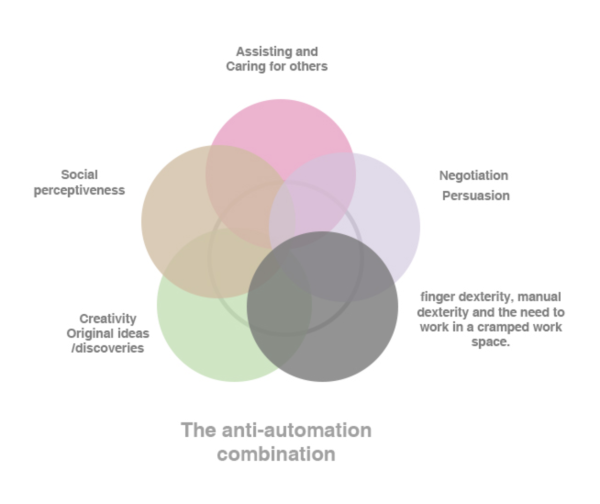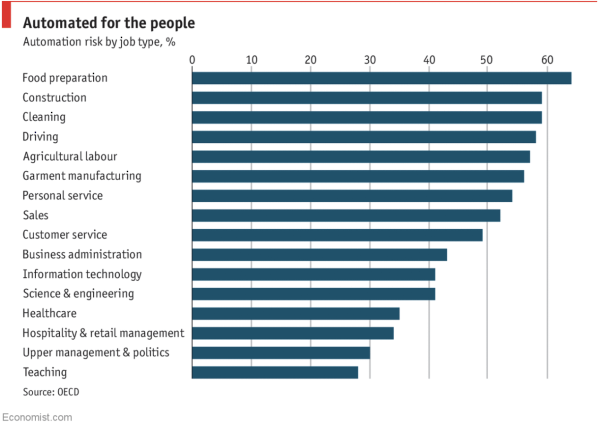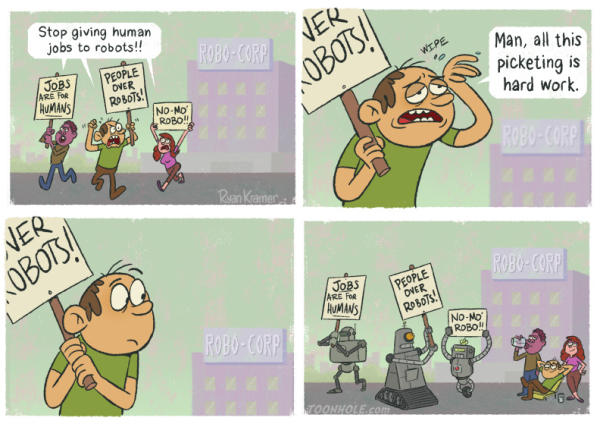Dread of a robot-dominated future is mounting. Is there basis for it?
Michael Osborne and Carl Frey, from Oxford University, calculated how susceptible various jobs are to automation. They based their results on nine key skills:
- social perceptiveness
- negotiation
- persuasion
- assisting and caring for others
- originality
- fine arts
- finger dexterity
- manual dexterity
- and the need to work in a cramped area
 via Michael Osborne & Carl Frey (Click For A Comprehensive Infographic)
via Michael Osborne & Carl Frey (Click For A Comprehensive Infographic)
There are various statistics about the rate of change for robots taking jobs. Many expect that ~50% of current jobs will be automated by 2035. Turns out, that statistic is from Michael and Carl, and the numbers were 47% by 20341.
The quote actually refers to the risk of them being automated. That 47% number doesn't take into account the cost, regulatory, political, or social pressures – so it's unlikely the full 47% will be realized.
 via The Economist
via The Economist
Many use that quote as a fear-monger toward future joblessness and an increasing lack of middle-class mobility, but Mr. Frey isn't a proponent of that belief and neither am I.
Industrialization created short-term strife but vastly increased the economic pie over the long-term. It's likely that future automation will have similar effects if managed correctly. It's possible to truncate the pain if we learn from previous iterations of this cycle. The fact that we're so far along technologically in comparison to previous revolutions means we're in a better position to proactively handle the transitory period.
We can't fail to manage the short-term consequences of the new tech because it will lead to unrest. If unrest and opposition to automation persist – it's likely the situation will be exacerbated. It's only by embracing innovation that we can make sure automation is a boon to the middle-class and not the bane of their existence.
Throughout history, technology has always created more jobs than it has destroyed – and while currently, that isn't the case, it doesn't mean it won't be. I often compare the AI revolution to the introduction of electricity. Electricity was a massive disruptor, and put many people out of work, but a fantastic benefit to society.
Doom and gloom sell. It's much easier to convince people something's going to be painful than amazing because we're creatures of habit and our monkey brains fear pain much more than they enjoy pleasure.
Our attitudes and actions play a pivotal role in how the world impacts us. Pragmatically, we have various institutions in place to make the transition as painless as possible – note that I wouldn't say painless, but as painless as possible.
Onwards!
_________________
[1] Frey, Carl & Osborne, Michael. (2013). The Future of Employment: How Susceptible Are Jobs to Computerisation?



